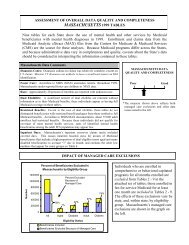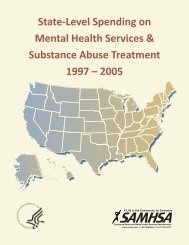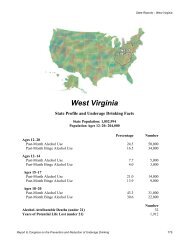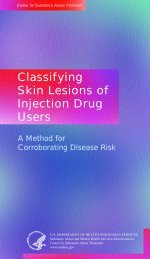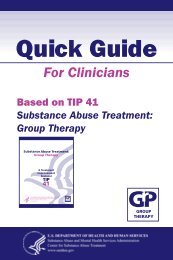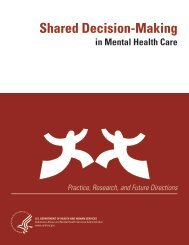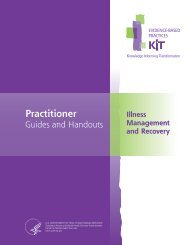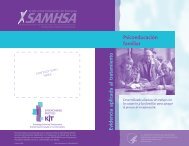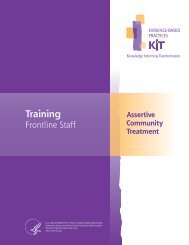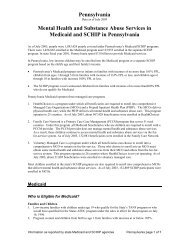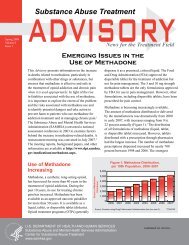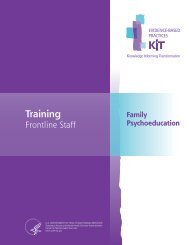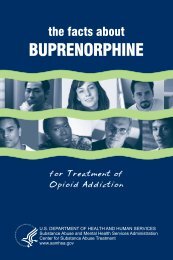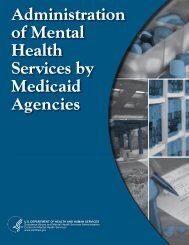TAP 21 - SAMHSA Store - Substance Abuse and Mental Health ...
TAP 21 - SAMHSA Store - Substance Abuse and Mental Health ...
TAP 21 - SAMHSA Store - Substance Abuse and Mental Health ...
You also want an ePaper? Increase the reach of your titles
YUMPU automatically turns print PDFs into web optimized ePapers that Google loves.
Appendix C – National Validation Study<br />
counselors will be reimbursed for services provided. Addiction counselors who are currently<br />
certified with only a high school diploma may have difficulty making the leap to a master’s<br />
degree. Many addiction counselors may not be able to obtain the advanced education needed<br />
fast enough to survive in the market.<br />
In 1993 the Center for <strong>Substance</strong> <strong>Abuse</strong> Treatment (CSAT) created the Addiction Technology<br />
Transfer Center (ATTC) Program to foster improvements in the preparation of addiction<br />
treatment professionals (Rohrer et al. 1996). As part of the ATTC Program, a National<br />
Curriculum Committee (the Committee) was established to evaluate existing curricula <strong>and</strong> to<br />
set priorities for current academic programs. At its first meeting, the Committee realized that<br />
the field had not defined the knowledge, skills, <strong>and</strong> attitudes that should be shared by all<br />
addiction counselors. Identifying <strong>and</strong> delineating these competencies became the Committee’s<br />
first task to professionalize the field.<br />
Representing a range of specialties within the substance abuse treatment field, members of the<br />
Committee provided practice-related information through a brainstorming process. Once the<br />
general responsibilities of the field were identified, the Committee developed task statements<br />
for each. Committee members ordered the responsibilities <strong>and</strong> task statements in a learning<br />
sequence, based on the order in which responsibilities are generally performed on the job.<br />
The process of identifying responsibilities was considered complete when the Committee<br />
reached consensus regarding the accuracy <strong>and</strong> sequence of the task statements produced.<br />
The Committee identified four transdisciplinary foundations <strong>and</strong> eight practice dimensions<br />
encompassing 1<strong>21</strong> competencies. These results are consistent with the DACUM (Develop a<br />
Curriculum) process (Norton 1985), which typically results in 8 to 12 responsibilities <strong>and</strong> 50<br />
to 200 tasks. The four transdisciplinary foundation categories were underst<strong>and</strong>ing addiction,<br />
treatment knowledge, application to practice, <strong>and</strong> professional readiness. The eight practice<br />
dimension categories were clinical evaluation; treatment planning; referral; case management;<br />
counseling; client, family, <strong>and</strong> community education; documentation; <strong>and</strong> professional <strong>and</strong><br />
ethical responsibilities. Each category had between 3 <strong>and</strong> 20 competencies in it. This effort<br />
resulted in the publication of Addiction Counselor Competencies (Addiction Technology<br />
Transfer Centers 1995).<br />
Although the Committee incorporated existing literature related to the work of addiction<br />
counselors, particularly the practice analysis conducted by Birch <strong>and</strong> Davis Corporation (1986)<br />
<strong>and</strong> the International Certification <strong>and</strong> Reciprocity Consortium Role Delineation Study<br />
(International Certification <strong>and</strong> Reciprocity Commission/Alcohol <strong>and</strong> Other Drug <strong>Abuse</strong> 1991)<br />
when developing the competencies that made up Addiction Counselor Competencies, it also<br />
relied on its own contributions. The Committee felt that job-related data provided a snapshot of<br />
what is, not what could be. And in the addiction counseling field, what is has been questioned.<br />
Because of its peer counselor <strong>and</strong> personal experience history, treatment provided by some<br />
addiction counselors has been described as narrow <strong>and</strong> inflexible, impeding the adoption of<br />
new treatment methods that may better meet the needs of clients. Moreover, lacking traditional<br />
academic preparation, some counselors have difficulty underst<strong>and</strong>ing literature <strong>and</strong><br />
incorporating new research results. Consequently, the Committee’s work emphasized moving<br />
the field forward. To gauge the potential value of the competencies, the Committee conducted<br />
a study to determine which of 1<strong>21</strong> competencies were perceived as necessary for practice by<br />
addiction counselors in the field.<br />
189



